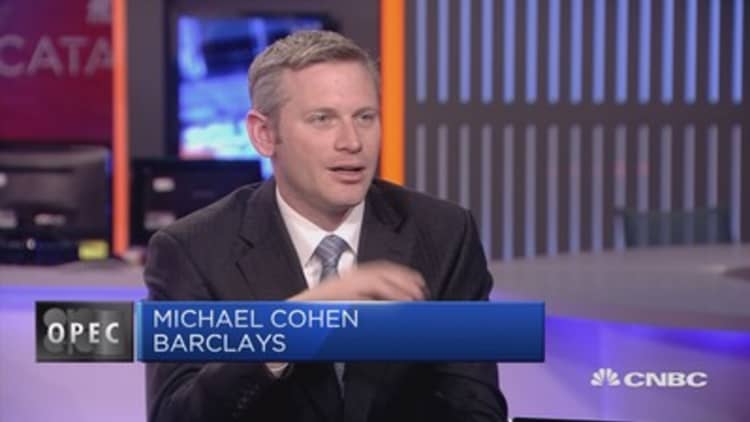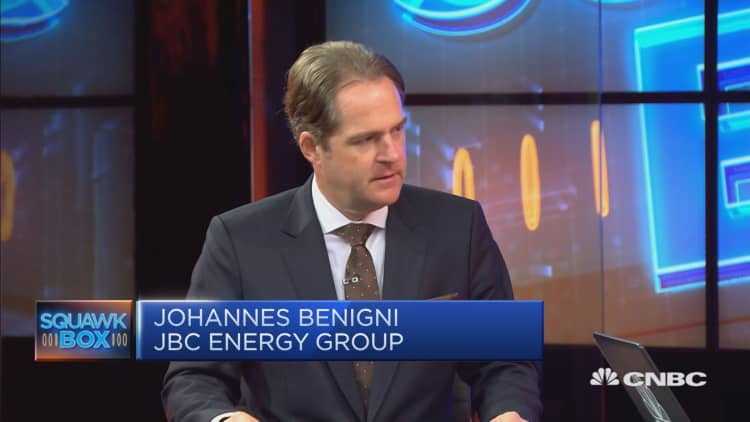Iraq won't be left hanging amid Washington's sanctions on Iran, which supplies almost half of its electricity, experts familiar with U.S. policy say.
The President Donald Trump administration in November granted Iraq a 45-day waiver to continue its energy purchases — and at the risk of setting off more instability in the country, the U.S. is now expected to continue allowing transactions with Iran under yet-to-be-decided conditions.
But the sanctions provide a new urgency to accomplish something Baghdad and Washington have been pursuing for some time: reducing the war-weary country's economic reliance on Tehran.
"I think that the U.S. is going to try to find a workaround for Iraq," Richard Nephew, who served as the State Department's lead sanctions expert for negotiations with Iran from 2013 to 2014, told CNBC. "The U.S. government knows that Iraq is a key country in the competition starting between the United States and Iran."
And after billions spent on years of war and occupation, Washington has a real interest in Iraq's success, he added, "not least of which is as a bulwark against Iran." A determination will be made to extend Iraq's waiver, a state department official told CNBC, though a decision has yet to be reached.
Iranian power in Iraq
Iran is Iraq's third-largest trading partner, with an estimated $12 billion in cross-border trade per year, and the majority-Shia countries share strong cultural, religious and geographic ties. And despite being OPEC's second-largest producer of oil, Iraq is dependent on Iranian natural gas plants for up to 45 percent of its electricity — a setup now facing potential jeopardy amid U.S. sanctions.

Without continued sanctions exemptions, Iraq could lose around a third of its power overnight, energy analysts say. Already burdened by failing infrastructure, pockets of ISIS activity and poor public service provision, the scenario makes Iraq a "ticking time bomb," according to Michael Stephens, a regional expert at the Royal United Services Institute in London.
Over the summer, Iraq failed to pay its electricity bill to Iran on time. This prompted Tehran to cut the power off and triggered widespread protests in the country's south, particularly in poverty-stricken Basra, where government buildings and the consulates of Iran and the U.S. were attacked.
US sanctions 'a win' for Iraq?
While millions of Iraqis maintain a loyalty to Iran — particularly for its role in supporting the Shia militias that played a pivotal role in the defeat of ISIS — many still describe its clout in the country as detrimental to stability and economic development.
They lament that Iran's overwhelming trade surplus with Iraq has made it nearly impossible for local Iraqi businesses to compete, and that Tehran can wage "political blackmail" against Baghdad via its control of the energy supply.
"U.S. sanctions against Iran is a win for Iraq," said Muhanad Seloom, an associate lecturer at the University of Exeter and former advisor to the Iraqi government. "The U.S. encouraged Iraq to export Kirkuk oil to compensate for Iran's sanctioned oil exports. At the same time, the U.S. is pushing Iraq to capture and use its own gas instead of importing it from Iran to operate power plants."
Seloom was referring to a $15 billion GE contract inked in late October and aimed at bringing more power to Iraq's outdated electricity grid. The project, as well as Washington's encouragement of Saudi Arabian and Kuwaiti investment in Iraqi power infrastructure, demonstrates the ongoing drive to reduce Iran's influence in the country.
Still, Iraqi leaders are negotiating sensitive ground, wary of angering Iran while acknowledging their continued need for U.S. support. Iraqi Prime Minister Adel Abdul-Mahdi this month signaled his opposition to the American sanctions, and has been in talks with his counterparts in Tehran to increase bilateral relations.
Risks to Iraqi stability
But as eager as the Trump administration is to curtail trade with Iran, moving too quickly could plunge Iraq back into chaos, warned Michael Rubin, a former Pentagon official and Arab affairs researcher at the American Enterprise Institute in Washington D.C.
Asked whether the U.S. is likely to continue granting waivers, Rubin replied, "Yes, absolutely."

"Even Trump administration Iran hawks understand that sanctioning Iraq would likely collapse the Iraqi government and open the door for even more pro-Tehran hardliners to take over," he said, adding that waivers are only a short-term solution and the Iraqi government "seems intent on weaning itself off Iranian gas for its own national security."
Still, projects like the GE deal are likely to take years to develop Iraq's energy self-sufficiency, according to regional energy analyst Shwan Zulal. "In the short term, Iraq cannot wean itself off Iran gas that easily without serious electricity shortages."
The best that Washington can do, Zulal believes, is to agree to extend waivers for a much longer time while supporting Iraq's power sector development. The inherent challenges in this, as well as coming up with an effective payment mechanism that doesn't end up enriching the Iranian government, he said, "could mean waiting for some time."


